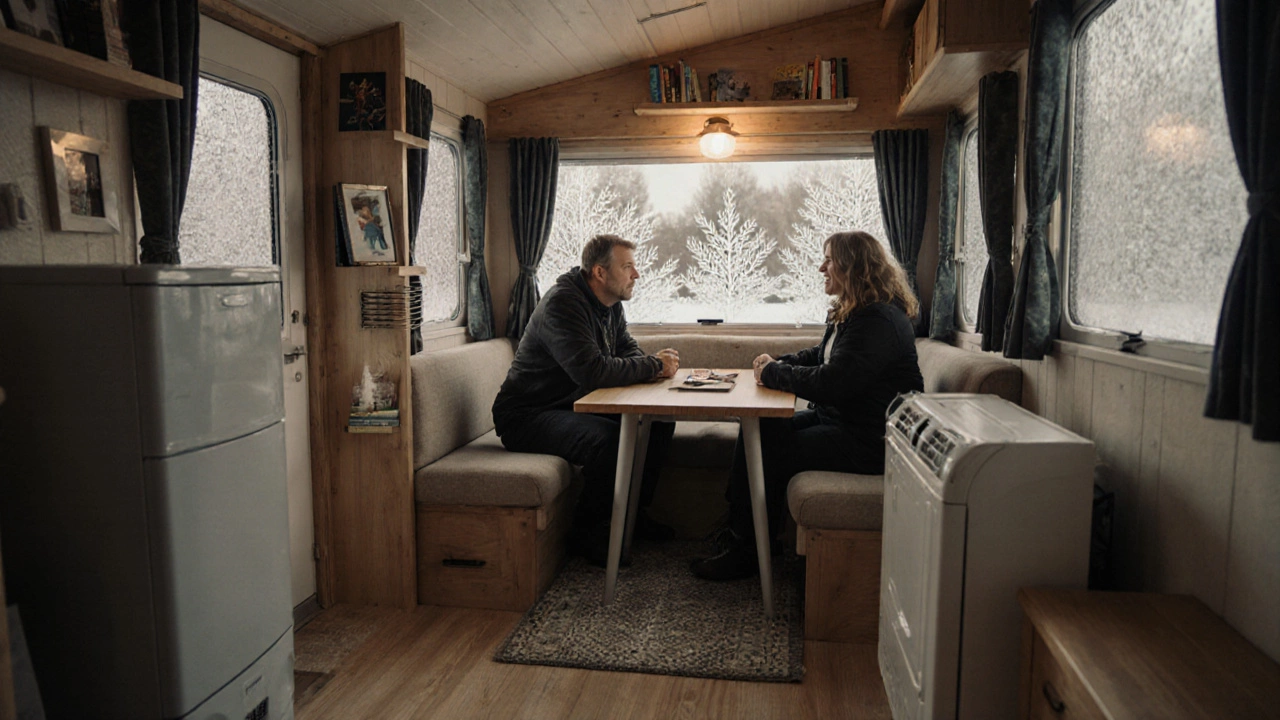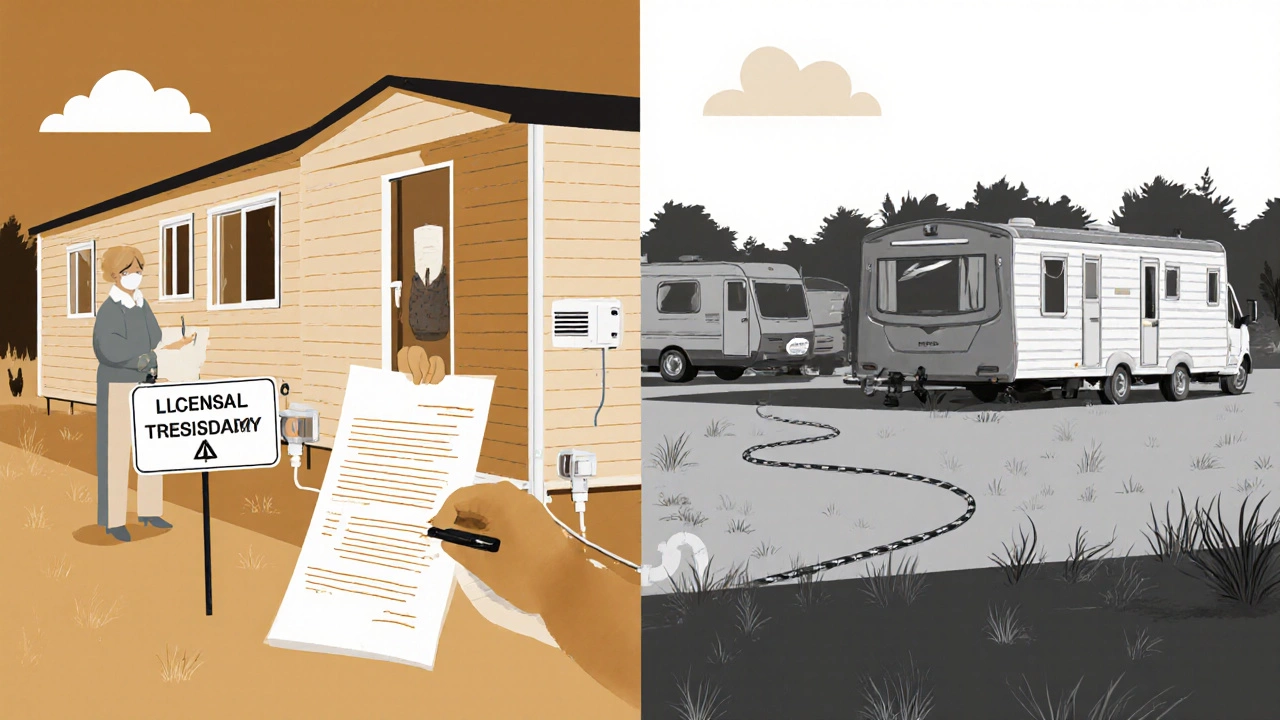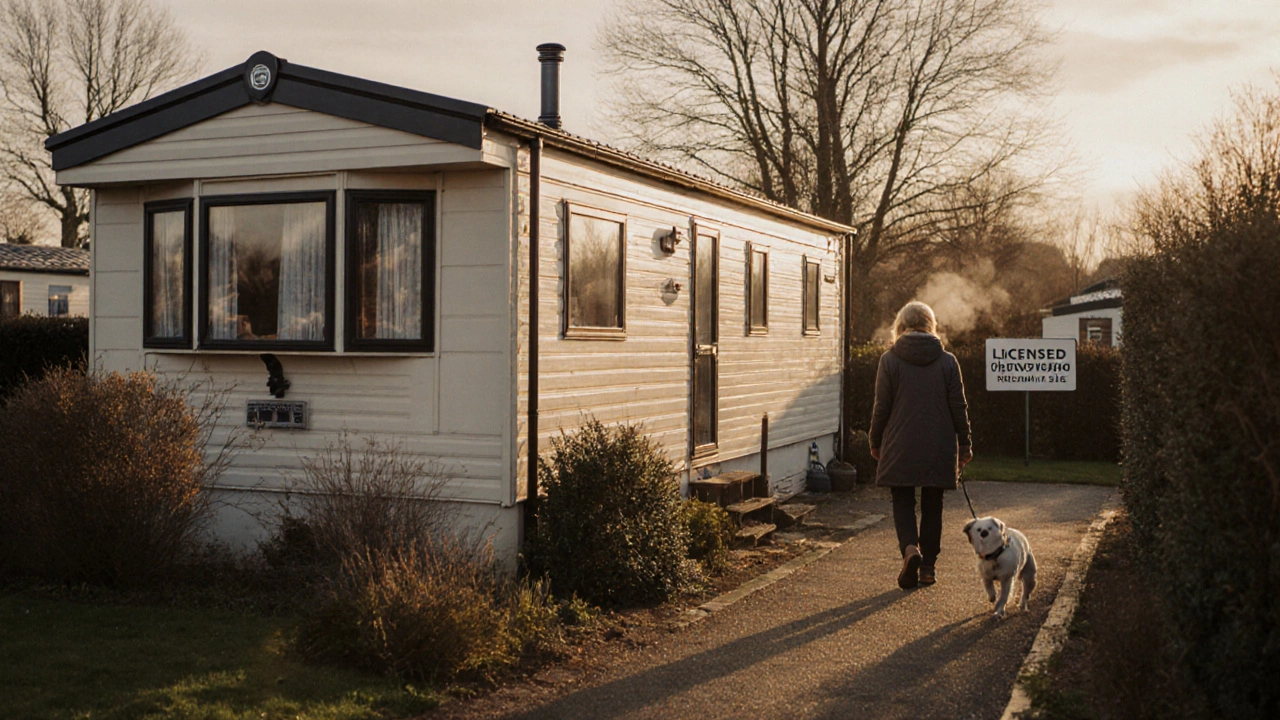Caravan Living Cost Calculator
Your Estimated Monthly Costs
Important Considerations
⚠️ Costs may be higher if you have an older caravan requiring significant heating upgrades.
⚠️ This estimate is based on UK residential caravan site data. Your actual costs may vary.
⚠️ Remember to check site rules about pets, extensions, and winter heating requirements.
Living permanently in a caravan isn’t just a dream for retirees or digital nomads-it’s a real, legal, and growing lifestyle across the UK. But where can you actually do it? Not every campsite allows year-round stays. Not every piece of land lets you hook up utilities. And not every local council will approve your static caravan as a primary residence. If you’re thinking about ditching the mortgage and moving into a caravan for good, you need to know the exact places that allow it, the rules that come with them, and the hidden traps most people miss.
Permanent Caravan Living Isn’t Allowed Everywhere
Many people assume that if a caravan park lets you stay for a few weeks, it’s fine to stay forever. That’s not true. Most holiday parks in the UK are licensed only for recreational use. They’re designed for short-term visitors, not residents. If you try to live there full-time, you could face fines, eviction, or even have your caravan towed away.
The key difference? Residential caravan sites versus holiday parks. Residential sites are legally permitted to house people as their main home. They have planning permission for permanent occupation, access to mains water and sewage, and are often located in rural or semi-rural areas. Holiday parks? They’re for holidays. Period.
There are about 1,200 residential caravan sites in the UK, according to the Mobile Homes Council. That’s not a lot compared to the 10,000+ holiday parks. So you’re not hunting for a needle in a haystack-you’re hunting for one specific type of needle.
Where to Find Approved Residential Caravan Sites
You can’t just Google ‘caravan sites for sale’ and expect to find a home. You need to look for sites that are registered under the Mobile Homes Act 1983 (as amended). These sites must meet specific legal standards:
- They must have a site license from the local council
- They must provide access to water, electricity, and waste disposal
- They must have a written agreement with residents
- They cannot charge excessive fees or evict you without legal cause
Here are the top three places to find these sites:
- Local council housing departments - Many councils maintain lists of approved residential caravan sites. Call your nearest one and ask for their list of licensed residential sites.
- Mobile Homes Council website - They have a directory of licensed sites across England and Wales. Sites are verified and updated annually.
- Specialist brokers - Companies like Caravan Homes Direct or Park Homes Online specialize in residential park homes. They handle viewings, legal checks, and paperwork.
Don’t rely on Facebook groups or Craigslist. Too many scams. Too many sites that look residential but aren’t legally permitted. Always ask for the site license number and verify it with the local authority.
What’s the Cost of Living in a Caravan Permanently?
One of the biggest draws is affordability. But it’s not always cheap. Here’s what you’re actually paying for:
| Cost Type | Average Monthly Cost | Notes |
|---|---|---|
| Site Fee | £350-£800 | Varies by location, amenities, and size of pitch |
| Utilities (water, electricity, sewage) | £80-£150 | Often included in site fee, but not always |
| Caravan Insurance | £120-£250/year | Must be specifically for residential use |
| Council Tax | £100-£200/month | Same as for houses; depends on band and area |
| Maintenance/Repairs | £50-£300/month | Roof leaks, damp, boiler issues-common in older units |
Compare that to renting a one-bedroom flat in London: £1,800-£2,500. In Manchester or Bristol? Still £1,200+. A caravan home can save you 50-70% on housing costs-if you avoid the pitfalls.

What You Can’t Do in a Residential Caravan Site
Even on approved sites, there are strict rules. Most people get into trouble because they assume it’s like living in a house.
- No short-term rentals - You can’t rent out your caravan to tourists. That’s a breach of your license and can get you evicted.
- No business use - Running a shop, salon, or Airbnb from your caravan is illegal unless the site has commercial planning permission.
- No building extensions - You can’t add a porch, shed, or conservatory without council approval. Most sites ban structural changes.
- No pets without permission - Some sites allow one small pet. Others ban them entirely. Always check.
- No changing the exterior - Painting your caravan bright purple? Installing solar panels on the roof? You need written permission. Many sites have strict appearance rules.
One man in Cornwall tried to turn his caravan into a tiny home with a greenhouse attached. The site manager gave him 30 days to remove it. He didn’t. His caravan was towed. He lost £15,000 in upgrades.
Is It Legal to Live in a Caravan on Your Own Land?
This is the most common question. Can you just park your caravan on your garden and call it home?
Short answer: No, not without planning permission.
The UK’s planning laws treat a caravan as a “mobile home.” If you want to use it as your main residence on private land, you need planning permission. That’s rare. Most councils won’t grant it unless:
- You’re a farm worker living on-site
- You have a disability and need accessible housing
- You’re rebuilding after a fire or flood
- The land is already zoned for residential use and the caravan meets building standards
Even if you get permission, you still need to connect to mains services. Off-grid living with a caravan on your land? It’s not legal as a primary residence. You can use it as a guest cabin, a studio, or a holiday retreat-but not your home.
What About Winter? Can You Live in a Caravan Year-Round?
Yes-but only if the caravan is properly insulated and heated. Most residential caravan sites require their units to meet the BS 3632:2015 standard. That means:
- Double-glazed windows
- At least 100mm of insulation in walls and roof
- A permanent heating system (not just portable heaters)
- Proper ventilation to prevent condensation
Many older caravans from the 1990s or early 2000s don’t meet this. They’re drafty, expensive to heat, and prone to damp. If you’re buying secondhand, get a professional inspection. A £200 survey can save you £5,000 in repairs.
One couple in Lincolnshire bought a 1998 caravan for £8,000. By January, their heating bill was £300/month. The walls were covered in mold. They had to replace the entire unit. They now live in a 2022 model with underfloor heating. Their bill? £75.

What’s the Catch? The Hidden Downsides
Living in a caravan isn’t all sunshine and savings. Here are the real challenges most people don’t talk about:
- Resale value - Caravans depreciate. A £30,000 unit might be worth £10,000 in five years. You’re not building equity like a house.
- Neighborhood stigma - Some people still see caravan living as “less than.” It can affect your kids’ school applications or social life.
- Site rules - You can’t just do what you want. No loud parties. No parking a second vehicle. No overnight guests beyond 14 days.
- Insurance gaps - Standard home insurance won’t cover a caravan. You need specialist cover. Many people don’t realize this until they have a fire or flood.
- Dependence on the site - If the site owner sells to a developer, you could be forced to move. Your legal rights protect you from eviction-but not relocation.
One woman in Somerset lived in her caravan for 12 years. Then the site was bought by a property company. They raised her site fee by 40% and gave her 18 months to move. She had to sell her caravan for half its value. She moved into a rented flat.
Who Is This Lifestyle Actually For?
Permanent caravan living isn’t for everyone. But it works well for:
- Retirees on a fixed income who want to downsize
- Couples or singles who want to escape high rent
- People who work remotely and don’t need a big space
- Those who love quiet, rural locations
- People who value simplicity and low maintenance
It’s not ideal if you have young kids who need big gardens, if you host frequent guests, or if you need a home office with high-speed internet. Many sites have poor broadband. Some still rely on dial-up.
Before you commit, visit at least five sites. Stay overnight. Talk to residents. Ask about the site manager. Ask what happens if they sell. Ask how many people have moved out in the last year-and why.
Next Steps: How to Start
If you’re serious, here’s your checklist:
- Visit the Mobile Homes Council website and download their list of licensed sites.
- Call your local council’s housing department and ask for their list of approved residential caravan sites.
- Set a budget: include site fees, utilities, insurance, and a 10% buffer for repairs.
- Visit at least three sites in person. Ask to speak to current residents.
- Get a professional survey on any caravan you’re considering buying.
- Read your site agreement carefully. Look for clauses on fees, eviction, and alterations.
- Apply for a council tax reduction if you’re on a low income. Caravan homes qualify for the same discounts as houses.
There’s no magic formula. But if you do your homework, you can live comfortably, affordably, and legally in a caravan for the rest of your life.
Can I live in a caravan on my own land in the UK?
Generally, no. You need planning permission from your local council to use a caravan as your main home on private land. Exceptions are rare and usually only granted for farm workers, people with disabilities, or in cases of emergency housing. Most councils won’t approve it for standard residential use.
Is it cheaper to live in a caravan than a house?
Yes, in most cases. Site fees range from £350 to £800 a month, and you avoid mortgage payments, high property taxes, and maintenance costs. Combined with lower utility bills and no estate agent fees, you can save 50-70% compared to renting a similar-sized flat in urban areas. But remember: caravans depreciate, so you’re not building long-term equity.
Can I get a mortgage for a caravan home?
No, traditional mortgages aren’t available for caravans because they’re not classified as permanent buildings. However, some lenders offer specialist loans for park homes, usually requiring a 20-30% deposit and proof of income. These are not mortgages in the legal sense-they’re personal loans secured against the caravan.
Do I have to pay council tax if I live in a caravan?
Yes. Caravan homes are classified as residential properties and are subject to council tax. They’re placed in a tax band just like houses. You can apply for discounts if you’re on a low income, live alone, or are a pensioner-same as if you lived in a flat or house.
What’s the difference between a static caravan and a park home?
A static caravan is usually a holiday home built to BS 3632:2015 standards but not intended for permanent residency. A park home is built to the same standard but is legally designed and licensed for full-time living. Park homes are often larger, better insulated, and have more durable materials. The key difference is the site license-only residential sites allow permanent occupation.
Can I live in a caravan during winter?
Yes, but only if your caravan meets modern insulation standards (BS 3632:2015) and has a permanent heating system. Older models are drafty and expensive to heat. Many people who try to live in unmodified holiday caravans in winter end up with damp, mold, and sky-high energy bills. Always check the insulation and heating before you move in.
What happens if the caravan site is sold?
Under the Mobile Homes Act, you have legal rights to stay even if the site changes ownership. The new owner must honor your existing agreement. However, they can raise your site fee (with notice) or ask you to move if they’re redeveloping the land. You can’t be forced out without a court order, but you’ll need to find a new site if the land is sold for housing development.
Are there any restrictions on pets in caravan parks?
Yes. Many sites allow one small pet, but others ban them entirely. Some require a pet deposit or proof of vaccinations. Always ask before signing an agreement. Large dogs, exotic animals, or multiple pets are rarely permitted. Check the site’s pet policy in writing.
Can I install solar panels on my caravan?
Sometimes. Most sites require written permission before you make any external changes. Solar panels are often allowed if they’re not visible from the road and don’t damage the roof. But some sites ban them to maintain a uniform appearance. Always ask first-don’t assume it’s okay.
Do I need special insurance for a caravan home?
Yes. Standard home insurance doesn’t cover caravans used as primary residences. You need specialist caravan home insurance that includes structural damage, theft, liability, and accidental damage. It typically costs £120-£250 a year. Failing to get the right policy could leave you with no cover if your caravan is damaged or destroyed.
